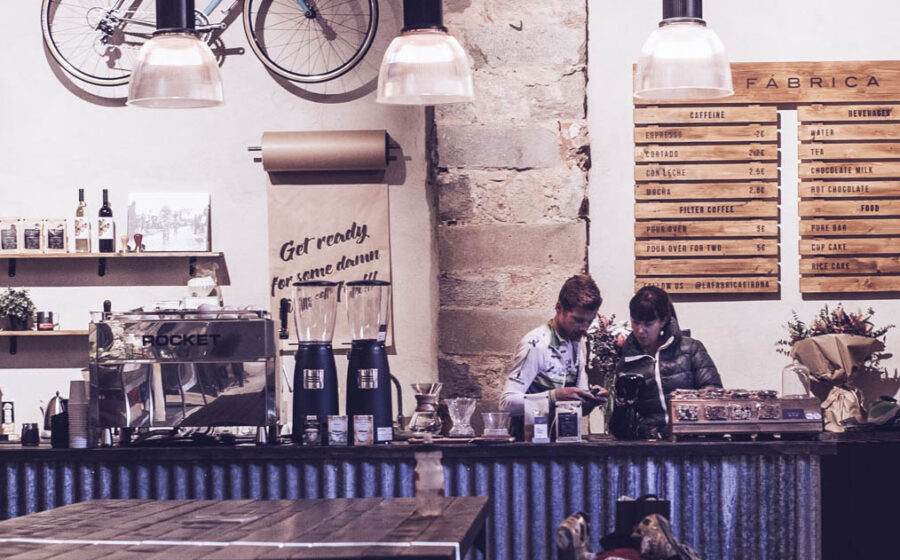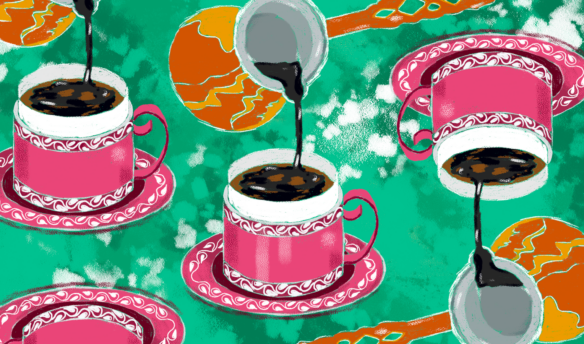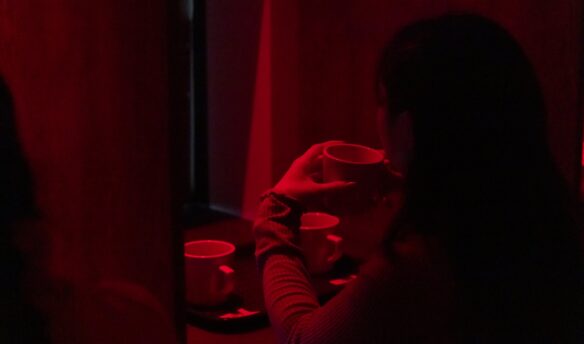[T]he city of Girona lies about an hour’s drive northeast of Barcelona, about twenty miles north and inland from the Mediterranean. Among English speakers, it’s best known by professional cyclists, who flock there to train during the season, which is what brought Christian Meier there from British Columbia about eight years ago when he joined his first professional team. Biking had long been a consuming passion for Meier, and a life in Girona fit him and his wife, Amber.
Like any professional athlete, Meier spends much of his life on the road (more than 150 days in 2014), and most anyone who travels that much develops a coffee habit. While in Portland for a race, he went to Stumptown, and, like with many people, it was revelatory. “From the first coffee, it absolutely blew me away,” he says. “Cappuccinos only came in one size. You could watch the guy roasting. They steamed the milk per cup. It was a completely new world.”
It didn’t take long for him to get deep into coffee, buying a Rocket home espresso machine and then a roaster. Of course, he began to imagine owning a café, but he and Amber, who had worked as a barista in Canada, decided to wait until he retired from cycling. As Christian became more obsessed with coffee, he and Amber were making Girona their permanent home. In 2014, Christian competed in the Tour de France for the first time, and while he wasn’t finished with his career, he felt the next big accomplishment he wanted wasn’t in cycling. Amber, meanwhile, needed something substantial to take on, especially in the months Christian was away.
They opened La Fábrica in March of last year, timing it with the professional cyclists’ yearly migration. “Those clients were already going to come,” Christian says. “We had a guaranteed market through the summer, no worries, especially in that first period. When you’re opening a business, having someone you are quite sure is going to come is quite a relief.”
La Fábrica sits in the middle of a T made where a road goes away from the front door and a wide walkway crosses it going down a hill. Walking past patio seating and into the shoebox-shaped café, customers step down into the shop. While it certainly takes furniture and lighting cues from Northern European and North American coffeehouses, by dint of residing inside a generations-old, exposed-stone furniture shop rather than a refashioned warehouse, La Fábrica feels Spanish in a nostalgic sense. Pendant lights hang from the tall ceiling and a communal table stretches the length of the floor. Along the long walls are coffee gear and merchandise. While the café has a cycling theme, it sidesteps kitsch easily and could even be missed entirely by coffee-focused guests.



The open bar, set at the back, holds a two-group Rocket R 8 and a pair of Compak F8 (formerly the K8) grinders, and next to them is a set of scales for rarely ordered pour-overs. La Fábrica will soon have a roaster, but over its first year the Meiers sourced their own beans and contracted them to be roasted in Barcelona. “I am always trying to replicate that coffee I had at Stumptown, to this day,” he says. “Obviously, I’m romanticizing what that coffee tastes like, but it’s what I’m chasing.”
The challenge of opening a specialty coffee shop in Spain is like that faced in France or Italy: you’re not fighting to build a coffee culture; you’re fighting an ingrained one. Christian buys single-origins from across the world and aims for a profile around a medium roast, whereas most Spanish coffee is dark and blended. Catalonia, like the rest of Spain, is café con leche country, and a cup usually costs a euro, while La Fábrica charges more than twice that and prepares it like a latte, complete with rosettas. Even the café’s communal table is outside most customers’ experience.
Even with those obstacles, it could be worse. Italian specialty roasters and cafés have it the hardest since their audience, never ecstatic with how espresso was translated, is appalled to have their national drink retranslated back to them. The French, still unused to not being the culinary lodestone, have at least cottoned lately that their coffee could be better. That’s not unlike those countries’ relationships with their cuisine, and in Spain, most certainly in Catalonia, cuisine is midway through a riot of invigoration and invention, and the Meiers find locals willing to try and then adopt their unusual and more expensive coffee because culinary adventurism and appreciation of quality are valued over hidebound tradition.
When they opened the shop, Christian estimates that seventy percent of the clientele was foreign, mostly people connected to cycling. This cycling offseason, it’s about ninety percent local, and they have more customers now.

On weekends, La Fábrica’s draw has as much to do with maple syrup or cheddar cheese as coffee. While Catalonians currently posses what many consider the world’s most dynamic cuisine (Girona is home to El Celler de Can Roca, ranked as the best restaurant on earth by a prestigious competition that makes such declarations), they are new to and interested in foreign foods, like La Fábrica’s sunrise sandwich, an exotic and decadent morning meal of bread, egg, bacon, and, dear lord, cheddar. “These are definitely the furthest from Catalonian flavors that exist,” says Christian. “People come in and it’s the first time they’ve experienced them.”
Christian recently signed a two-year cycling contract, so his racing career is fully on. Like during last year’s race season, Amber will run the show in Girona, while he checks in from wherever he is, buying green beans and sorting out how to stay on top of roasting while competing. It’s a challenge, but with fellow cyclists as a natural clientele and strange dishes like croissant french toast drizzled with chocolate to entice locals, it’s the challenge the Meiers wanted.
—Cory Eldridge is Fresh Cup’s editor.

















